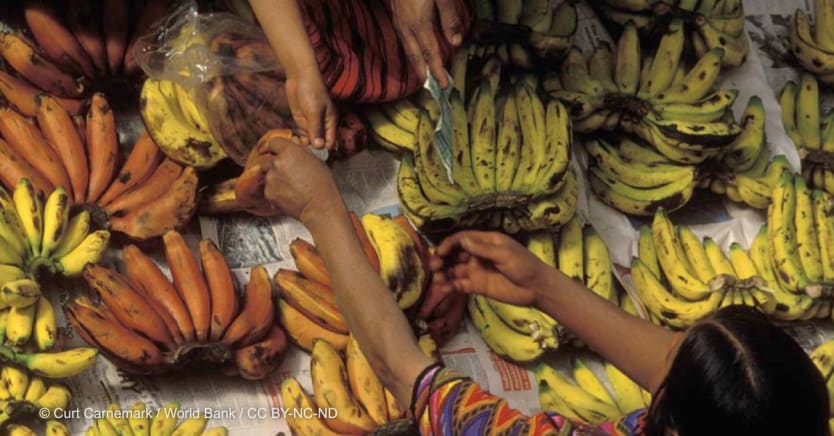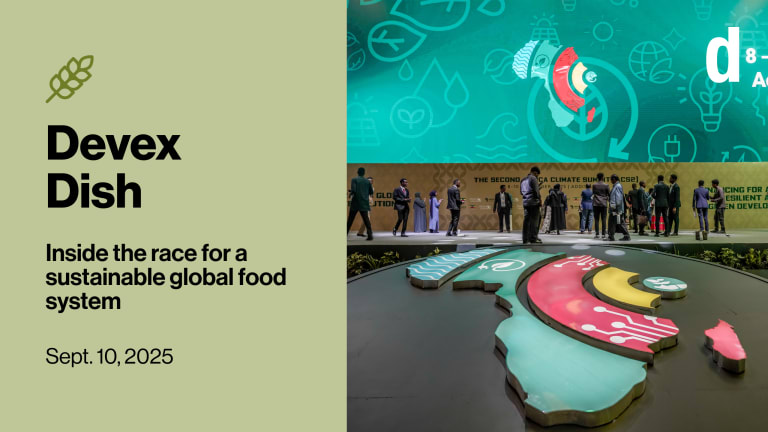
If the United Nations’ upcoming Food Systems Summit is to galvanize change in global food systems, marginalized groups such as women, Indigenous peoples, and youths must be engaged in reform efforts, according to participants at a pre-summit event.
As the three-day Food Systems Pre-Summit concluded Wednesday in Rome, delegates had an eye on the main summit event, which is set to take place later this year in New York. Organizers said they hope the gathering will see countries make concrete announcements of action and financing that will remake the way the world grows, distributes, markets, and consumes food — even as some groups are declining to participate in the process.
Visit our series, The Future of Food Systems
Find out how we can make food fair and healthy for all. Join the conversation using the hashtag #FoodSystems and visit our The Future of Food Systems page for more coverage.
“Anything we do, we know that we must include those at the center of our food systems, and we have heard them: our smallholder farmers, our Indigenous people, our youth, our women. It also means working with partners in the private sector to ensure that innovations reach the most marginalized and that all jobs in the food sector offer decent livelihoods,” U.N. Deputy Secretary-General Amina Mohammed said Wednesday.
“Government alone cannot deliver this agenda. It will require new ways of working. It will require new mindsets. It may also mean working with … partners that, quite frankly, sometimes make us feel really uncomfortable.”
Mohammed said that while the COVID-19 pandemic has shown that the global food system is broken — leaving up to 811 million people hungry, even as the world produces enough food to feed everyone — it also has a “silver lining” in elevating food systems reform.
“We need clear commitments and clarity on the way ahead. We cannot and will not accept the illusion of participation.”
— Anne Nuorgam, chair, U.N. Permanent Forum on Indigenous IssuesOriginally announced by U.N. Secretary-General António Guterres in 2019, the upcoming summit is bringing together people from across the food system for five “action tracks,” with the aim of breaking down silos between areas such as nutrition and climate change.
The past year saw a series of dialogues around those action tracks to gather ideas and feedback, which were then distilled into “solutions clusters” of similar suggestions. At the pre-summit, organizers announced several “priority coalitions” of broader topics that will be emphasized leading into the summit. Those include hunger, school meals, food waste and loss, resilience, and agroecology and sustainable livestock and agricultural systems.
Anne Nuorgam, chair of the U.N. Permanent Forum on Indigenous Issues, said her group considered it important to continue engaging with the summit process even if its members did not feel Indigenous people were adequately included when priorities were identified.
“When the summit changed from five action tracks with over 2,000 ‘game changers’ to 52 clusters — and now it seems to five to 10 coalitions — we continued to support the process even though not only were we not consulted on these decisions, but we don’t even know how they were made,” Nuorgam said. “We have been doing our part in good faith to make sure that this is a true ‘people’s summit.’”
But other groups have decried what they called undue “corporate influence” in the summit process and decided not to participate in the U.N. effort. Instead, they have organized a rival “Global People’s Summit” that they say will be more responsive to vulnerable constituencies such as Indigenous peoples and farmers.
Devex is launching a weekly newsletter on food systems soon — sign up to receive the first edition.
“They have stepped away because their concerns, which are similar to ours, have not been addressed,” Nuorgam said. However, she added that her group “collectively decided to continue engaging in the summit process because our people at home in Indigenous communities have high expectations.”
“But now it’s time for action. We need clear commitments and clarity on the way ahead. We cannot and will not accept the illusion of participation,” Nuorgam continued.
Mohammed acknowledged that not everyone feels included in the summit process, despite professions from the U.N. that its own event is a people’s summit. She said the U.N. should be putting Indigenous people and youths at the center of its efforts, and ensure everyone is “in the room.”
“There are still a few that are outside this room — … those who have decided not to join us because they don’t quite think that we represent what it is that they care about.” Mohammed said. “So the next step before the summit is to find ways to make sure that everyone’s in the room. We can agree to disagree, but everyone needs to be in the room.”
Search for articles
Most Read
- 1
- 2
- 3
- 4
- 5








